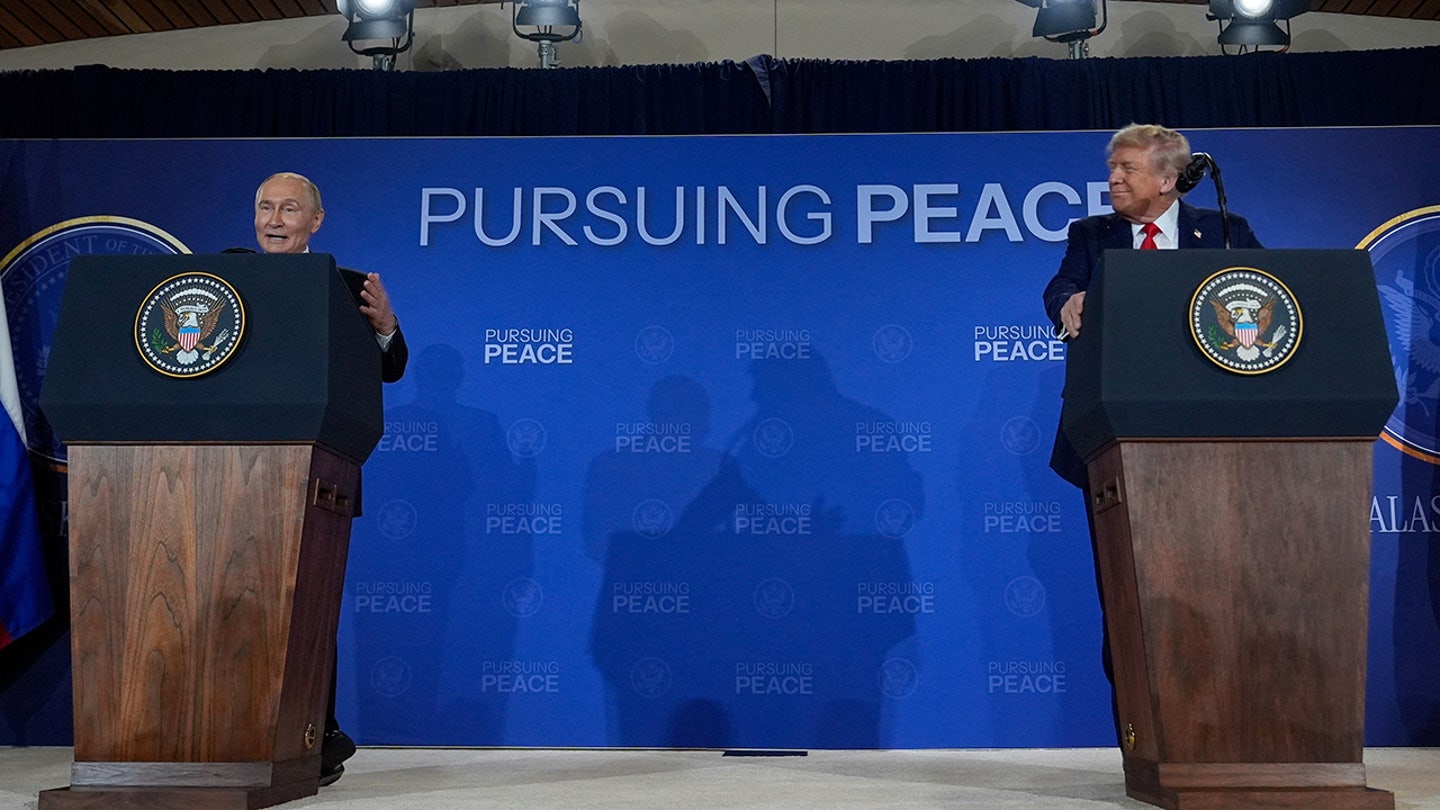
Democrats doubt Trump will secure Ukraine cease-fire in Alaska summit with Putin
Entities mentioned:
- Congressional Democrats: Wariness, Skepticism, Duty
- President Donald Trump: Ambition, Legacy, Power
- Russian President Vladimir Putin: Power, Control, Self-preservation
- Sen. Mark Warner: Wariness, Duty, Security
- House Minority Leader Hakeem Jeffries: Wariness, Duty, Justice
- Sen. Jeanne Shaheen: Skepticism, Duty, Wariness
- Sen. Lindsey Graham: Righteousness, Duty, Justice
- Sen. Richard Blumenthal: Justice, Security, Wariness
Article Assessment:
Credibility Score: 75/100
Bias Rating: 45/100 (Center)
Sentiment Score: 35/100
Authoritarianism Risk: 25/100 (Generally Democratic)
Bias Analysis:
The article presents views from multiple Democratic sources, but also includes Trump's perspective. It maintains a relatively balanced tone, presenting different viewpoints without overtly favoring one side.
Key metric: US Diplomatic Influence
As a social scientist, I analyze that this article highlights the complex dynamics surrounding US-Russia relations and the ongoing conflict in Ukraine. The skepticism expressed by Congressional Democrats regarding Trump's ability to secure a ceasefire reflects a broader concern about the effectiveness of US diplomacy in this high-stakes situation. The article suggests a potential shift in Trump's approach to Putin, which could impact US diplomatic influence. However, the Democrats' wariness indicates a lack of trust in the administration's ability to negotiate effectively with Russia. The proposed sanctions package and the emphasis on not making concessions without Ukraine's involvement demonstrate a desire to maintain a strong stance against Russian aggression. This situation has significant implications for US diplomatic influence, as the outcome of the summit could either strengthen or weaken America's position on the global stage, particularly in relation to dealing with authoritarian regimes and supporting democratic allies.

Mark Cuban says Trump running for a third term would push him into 2028 race
Entities mentioned:
- Mark Cuban: Duty, Self-preservation, Righteousness
- Donald Trump: Power, Ambition, Legacy
- Democratic Party: Unity, Power, Influence
- J.D. Vance: Ambition, Loyalty, Power
- Scott Galloway: Ambition, Recognition, Influence
- Jon Stewart: Influence, Righteousness, Recognition
- James Talarico: Ambition, Influence, Recognition
Article Assessment:
Credibility Score: 70/100
Bias Rating: 55/100 (Center)
Sentiment Score: 45/100
Authoritarianism Risk: 35/100 (Generally Democratic)
Bias Analysis:
The article presents multiple perspectives and quotes directly from the primary source. However, it leans slightly right by focusing on Democratic Party struggles and Trump's influence, while not deeply exploring alternative viewpoints.
Key metric: Political Stability Index
As a social scientist, I analyze that this article highlights the ongoing political uncertainty in the United States, particularly within the Democratic Party. Mark Cuban's conditional stance on running for presidency underscores the lingering influence of Donald Trump on the political landscape, even after his presidency. The mention of Trump potentially seeking a third term, though unconstitutional, suggests a persistent challenge to democratic norms. The Democratic Party's struggle to find new leadership indicates a period of transition and potential ideological shift. Cuban's preference for non-traditional political figures as potential candidates reflects a growing disillusionment with established politicians, which could impact future voter behavior and party dynamics. This situation could lead to increased political polarization and instability, potentially affecting the country's Political Stability Index.

Newsom's office continues to mock Trump using his social media writing style: 'TINY HANDS'
Entities mentioned:
- Gavin Newsom: Competitive spirit, Ambition, Recognition
- Donald Trump: Power, Pride, Recognition
- Vladimir Putin: Power, Influence, Control
- California Democrats: Power, Control, Competitive spirit
- Texas Republicans: Power, Control, Competitive spirit
Article Assessment:
Credibility Score: 70/100
Bias Rating: 35/100 (Lean Left)
Sentiment Score: 30/100
Authoritarianism Risk: 45/100 (Mixed/Neutral)
Bias Analysis:
The article leans left, primarily presenting Newsom's perspective and actions without substantial counterbalance. While it reports factual events, the framing and extensive quoting of Newsom's mocking posts suggest a bias favoring Democratic viewpoints.
Key metric: Political Polarization
As a social scientist, I analyze that this article showcases the increasing political polarization in the United States. Governor Newsom's office is employing a provocative communication strategy that mimics and mocks former President Trump's distinctive social media style. This approach, while potentially effective in galvanizing Newsom's base, risks further deepening the divide between political factions. The use of exaggerated claims, personal attacks, and inflammatory language in official communications from a governor's office indicates a shift towards more confrontational and less diplomatic political discourse. This could potentially impact democratic norms and expectations of civil political engagement, contributing to a more divisive political climate.

Texas House Speaker vows runaway Dems will be arrested if they try to sneak home over weekend
Entities mentioned:
- Dustin Burrows: Control, Power, Determination
- Texas Democrats: Righteousness, Justice, Self-preservation
- Greg Abbott: Power, Control, Determination
- Gavin Newsom: Ambition, Competitive spirit, Power
- Donald Trump: Power, Control, Influence
- Gene Wu: Justice, Righteousness, Determination
- Ken Paxton: Power, Control, Loyalty
Article Assessment:
Credibility Score: 70/100
Bias Rating: 55/100 (Center)
Sentiment Score: 30/100
Authoritarianism Risk: 65/100 (Authoritarian Tendencies)
Bias Analysis:
The article presents both Republican and Democratic perspectives, but slightly more space is given to Republican actions and quotes. The framing of Democrats as 'runaway' and 'fleeing' suggests a subtle lean towards Republican narrative.
Key metric: Electoral Competitiveness
As a social scientist, I analyze that this article highlights the intense political maneuvering around congressional redistricting in Texas and California, which directly impacts electoral competitiveness. The actions of both Republican and Democratic parties demonstrate a concerted effort to gain political advantage through map-drawing, potentially reducing the number of competitive districts. This could lead to increased polarization and decreased representation of diverse viewpoints. The use of tactics such as fleeing the state to prevent quorum and threats of arrest indicate a heightened level of partisan conflict, which may erode democratic norms and public trust in the electoral process. The contrasting approaches in Texas and California also reflect the broader national debate on redistricting methods and their impact on fair representation.

California Democrats unveil redistricting map to wipe out 5 GOP seats, counter Texas plan
Entities mentioned:
- Democratic Congressional Campaign Commission (DCCC): Power, Control, Justice
- Gov. Gavin Newsom: Ambition, Power, Revenge
- California Democrats: Power, Control, Competitive spirit
- President Donald Trump: Power, Control, Self-preservation
- Republicans: Power, Control, Self-preservation
- Arnold Schwarzenegger: Justice, Duty, Righteousness
- National Republican Congressional Committee (NRCC): Power, Control, Competitive spirit
Article Assessment:
Credibility Score: 65/100
Bias Rating: 55/100 (Center)
Sentiment Score: 35/100
Authoritarianism Risk: 65/100 (Authoritarian Tendencies)
Bias Analysis:
The article presents viewpoints from both Democrats and Republicans, including criticisms of each side's actions. However, there's slightly more space given to Democratic perspectives and plans, balanced by including Republican and non-partisan voices.
Key metric: Political Polarization Index
As a social scientist, I analyze that this article highlights the intensifying political polarization in the United States, particularly through the lens of redistricting efforts. The proposed redistricting in California, aimed at countering similar efforts in Texas, demonstrates an escalation in partisan tactics. This tit-for-tat approach to redistricting, with each side accusing the other of 'rigging' the system, is likely to further entrench political divisions and erode trust in democratic processes. The willingness to alter established non-partisan systems for short-term political gain, as seen in Newsom's proposal to temporarily replace the independent redistricting commission, indicates a concerning trend towards prioritizing party power over institutional stability. This could lead to increased cynicism among voters and potentially lower faith in the electoral system, ultimately impacting the Political Polarization Index negatively.

Putin backs Trump's claim that the Ukraine war would not have happened if he’d won 2020 election
Entities mentioned:
- Vladimir Putin: Power, Influence, Control
- Donald Trump: Ambition, Power, Influence
- Joe Biden: Duty, Influence, Security
- Volodymyr Zelenskyy: Self-preservation, Duty, Determination
Article Assessment:
Credibility Score: 55/100
Bias Rating: 65/100 (Lean Right)
Sentiment Score: 45/100
Authoritarianism Risk: 55/100 (Mixed/Neutral)
Bias Analysis:
The article leans right, favoring Trump's narrative and giving substantial space to Putin's supportive comments. It presents criticism of the Biden administration without equal counterbalance, suggesting a right-leaning bias in its framing and source selection.
Key metric: International Relations and Diplomacy
As a social scientist, I analyze that this article presents a significant shift in US-Russia relations under Trump's presidency. Putin's endorsement of Trump's claims about preventing the Ukraine war suggests a potential realignment of global power dynamics. This could impact US diplomatic standing, particularly with NATO allies and Ukraine. The article highlights a stark contrast between Trump's approach to Russia and that of the Biden administration, potentially influencing future US foreign policy. The meeting's optics and Putin's praise for Trump may raise concerns about US commitment to its traditional allies and democratic values on the global stage.

Housing chief: Opportunity zones change people's lives
Entities mentioned:
- Scott Turner: Professional pride, Duty, Influence
- U.S. Housing and Urban Development: Duty, Influence, Unity
- Lara Trump: Influence, Recognition, Ambition
Article Assessment:
Credibility Score: 50/100
Bias Rating: 65/100 (Lean Right)
Sentiment Score: 70/100
Authoritarianism Risk: 35/100 (Generally Democratic)
Bias Analysis:
The article leans right due to its featuring of a Trump administration official and Lara Trump, a member of the Trump family. The framing appears to present opportunity zones in a positive light without presenting alternative viewpoints or potential criticisms.
Key metric: Economic Mobility
As a social scientist, I analyze that this article focuses on the impact of opportunity zones on communities across the United States. The discussion of 'transforming' communities suggests potential improvements in economic conditions and quality of life for residents in these areas. This could positively affect economic mobility by creating new opportunities for employment, business development, and investment in previously underserved areas. However, the lack of specific data or examples in the article limits a comprehensive assessment of the actual impact on economic mobility.

Victor Davis Hanson shares what's setting Democrats 'on fire'
Entities mentioned:
- Victor Davis Hanson: Influence, Recognition, Righteousness
- Democrats: Moral outrage, Fear, Self-preservation
- Donald Trump: Power, Revenge, Influence
- Zohran Mamdani: Ambition, Recognition, Influence
- Hoover Institution: Influence, Legacy, Professional pride
Article Assessment:
Credibility Score: 55/100
Bias Rating: 75/100 (Lean Right)
Sentiment Score: 35/100
Authoritarianism Risk: 45/100 (Mixed/Neutral)
Bias Analysis:
The article leans right, evident in its framing of Democrats negatively and the positive presentation of critiques against 'woke' ideology. The source, featuring a conservative think tank fellow on a right-leaning show, further indicates a rightward bias.
Key metric: Political Polarization Index
As a social scientist, I analyze that this article likely contributes to increased political polarization. The framing of Democrats as 'melting down' and the focus on conflict between political ideologies suggests a deepening divide. The mention of Trump 'targeting the roots of woke-ness' implies an ongoing culture war, which often exacerbates partisan tensions. This type of rhetoric, especially from influential figures like Hanson, can reinforce existing political divides and potentially increase the Political Polarization Index.

Trump: We're going straight to Russia-Ukraine peace deal, 'not a mere ceasefire'
Entities mentioned:
- Donald Trump: Ambition, Legacy, Power
- Vladimir Putin: Power, Security, Control
- Volodymyr Zelenskyy: Justice, Self-preservation, Unity
- Keir Starmer: Duty, Unity, Influence
- Emmanuel Macron: Influence, Unity, Duty
Article Assessment:
Credibility Score: 65/100
Bias Rating: 55/100 (Center)
Sentiment Score: 65/100
Authoritarianism Risk: 35/100 (Generally Democratic)
Bias Analysis:
The article presents multiple perspectives, including those of Trump, Putin, and Zelenskyy, providing a relatively balanced view. However, there's a slight emphasis on Trump's role and optimism about the peace process, which could indicate a subtle center-right lean.
Key metric: International Diplomacy Effectiveness
As a social scientist, I analyze that this article presents a significant shift in the approach to the Russia-Ukraine conflict, with Trump positioning himself as a key mediator aiming for a comprehensive peace deal rather than a ceasefire. This approach could potentially impact international diplomacy effectiveness by bypassing traditional diplomatic channels and leveraging personal relationships between leaders. The involvement of European leaders suggests a coordinated Western approach, but the effectiveness hinges on Putin's willingness to participate in a trilateral meeting and make concessions. The article implies a potential breakthrough, but the long-term sustainability of any agreement remains uncertain given the complex security concerns and historical context of the conflict.

Top House Dem sides with Mamdani critics on key controversy surrounding his campaign
Entities mentioned:
- Hakeem Jeffries: Political calculation, Duty, Self-preservation
- Zohran Mamdani: Ambition, Justice, Influence
- Andrew Cuomo: Revenge, Political calculation, Power
- Dora Pekec: Loyalty, Righteousness, Determination
- Alex Bradley: Moral outrage, Loyalty, Indignation
- Michael Koncewicz: Moral outrage, Indignation, Righteousness
Article Assessment:
Credibility Score: 70/100
Bias Rating: 55/100 (Center)
Sentiment Score: 30/100
Authoritarianism Risk: 35/100 (Generally Democratic)
Bias Analysis:
The article presents multiple perspectives, including critics and supporters of Mamdani. However, it gives more space to critical voices and frames the issue as problematic for Mamdani's campaign.
Key metric: Political Party Unity
As a social scientist, I analyze that this article highlights internal Democratic Party tensions surrounding a progressive candidate in New York City. The controversy over Mamdani's housing situation exposes ideological rifts within the party, with establishment figures like Jeffries distancing themselves from more left-leaning candidates. This impacts party unity by potentially alienating progressive voters and activists, while also revealing the challenges Democrats face in reconciling diverse policy positions within their coalition. The situation underscores the ongoing struggle between centrist and progressive factions in the Democratic Party, which could affect voter turnout and party enthusiasm in future elections.